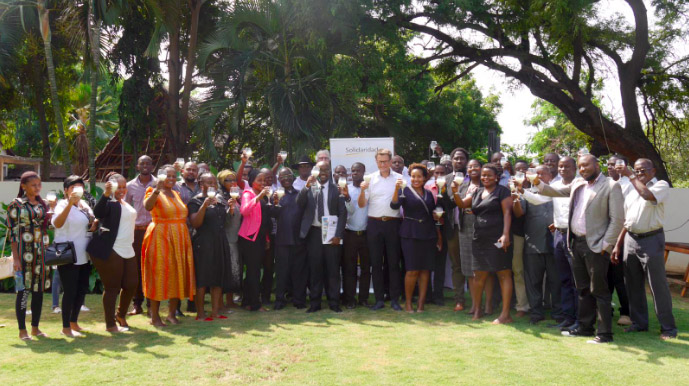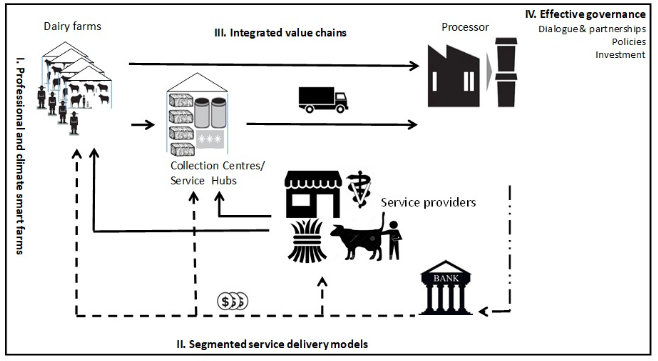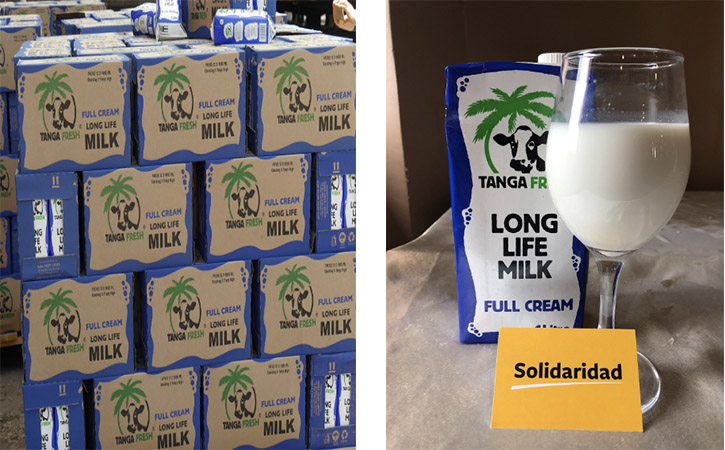
“For dairy companies, farmers are the real capital in the value chain”, said Rachel Wanyoike, Managing Director of Solidaridad East and Central Africa, at the launch of our new dairy pilot programme in the Tanga region of Tanzania.
Solidaridad’s partner, dairy company Tanga Fresh, wants to work with more producers who provide higher quantities of good quality milk, like so many dairy companies in developing countries. The new pilot project will develop several business cases throughout the value chain. The ultimate goal is to create a better position for entrepreneurial farmers to enable them to double their milk production by 2025.
Tanga dairy 2025: sustainable and climate-smart
Based on the specific context and demands of farmers, the programme will support:
- 500 lead farmers (8% of total group) with farm development plans and training
- Young farmers with new farm settlements
- Farmer societies to upgrade their milk collection centres to service centres
- The development of a fodder production centre.
This will be followed by an investment plan for upscaling and creating linkages to impact investors. The programme will help to professionalize the Tanga dairy sector and make it climate-smart.
The project is funded by Rabobank Foundation and Achmea Foundation and implemented by Tanga Fresh, Mruazi Farm and Solidaridad.
Cooperation with local stakeholders
The implementation of the programme will be carried out in cooperation with two local stakeholders. Tanga Fresh, based in Tanga, is currently the most advanced dairy plant in Tanzania, co-owned by TDCU – a local association of dairy farmers. The Mruazi Heifer Breeding Unit farm, situated near Hale, Korogwe District, aims to have a positive impact on the development of the dairy sector in Tanga region by producing heifers. Mruazi has the ambition to develop its farm into a regional centre for fodder production, training and innovation.
Farmers need knowledge, fodder, services, a payment system and finance. These needs have shaped the design of the programme.
Catherinus Wierda, International Programme Manager Dairy, Solidaridad
The Tanga smallholder dairy sector
Traditional and smallholder dairy farming in the Tanga region is an important source of income for around 6,000 rural families involved in milk production. Although the Tanga region is characterized by rural poverty, food shortages and drought, smallholder dairy farming is part of Tanga’s culture. It has good potential to become a solid and sustainable means of providing better livelihoods and food security to the people in this region.
Currently, the average supply of milk by dairy farmers to the local milk collection centres is less than 10 litres of milk per smallholder farmer per day. The demand for milk from the formal market presents farmers with a viable economic opportunity.
The development of a business case in a region such as Tanga requires the entire value chain of dairy to work well, with each essential actor or element in place. The figure below illustrates such a value chain approach developed by Solidaridad. Here, Tanga Fresh fulfils the role of processor (top right on the figure) and the Mruazi farm that of a service provider (centre right).

The newly launched pilot programme is aimed at the development of various, unique business cases for diverse target groups, among which the following:
- Farming societies working with existing milk collection centres to become dairy hubs as commercial service providers
- Commercial fodder production (new)
- Existing farmers in Tanga: through improved services, fodder and payment systems, using existing structures such as milk collection centres
- Existing business-oriented farmers: through providing support in farm management, farm data and planning to improve performance, and acquire access to credit for further investments
- Potential new group of young professional farmers: with the aim of developing professional and profitable medium-sized dairy farms, including the provision of extra facilities and support such as land, services, credit, skills and knowledge.
Through the various business cases, the new pilot will create an enabling environment to further upscale the development of the professional and climate-smart dairy sector in Tanga.
A healthy dairy sector cannot be accomplished by one person. The processor cannot work alone. The value chain will only be successful if it works as a system.
Dr. Felix Nandonde, Director of Production and Marketing at Tanzania’s Ministry of Livestock and Fisheries
The new pilot programme in Tanga
The expected length of the initial pilot programme is 2.5 years. Our aim is to continue the development and professionalization of the dairy sector in Tanga beyond 2022 by means of an investment programme with various stakeholders as partners. The ambition is to accelerate the development of more dairy hubs, working with more farmers who will reap the benefits of better dairy farm management, with more fodder available (especially in the dry season) and more dairy farm settlements in order to increase productivity by 15% per annum.

Climate-smart dairy farming
Increasing demand for milk presents farmers with a good economic opportunity. However upscaling milk production of cows with low productivity combined with lack of fodder in the dry season will have a negative impact on the climate (greenhouse gas emissions) and land use (overgrazing).
The challenge is therefore to increase milk production through stimulating better productivity of cows, resulting in a reduced, or even positive, environmental impact. A professional and efficient dairy system is synonymous with climate-smart agriculture with relatively low emissions of greenhouse gas per litre of milk.
New strategy for developing the dairy sector
Solidaridad has extensive experience in building sustainable value chains in dairy. The pilot programme in Tanzania is a good example of a project developed and implemented according to our recently published strategy, Dairy as Meaningful Proposition.
Our ambition is to develop more dairy (pilot) programmes according to this strategy in other countries and regions, taking into consideration the local, context-specific needs.
